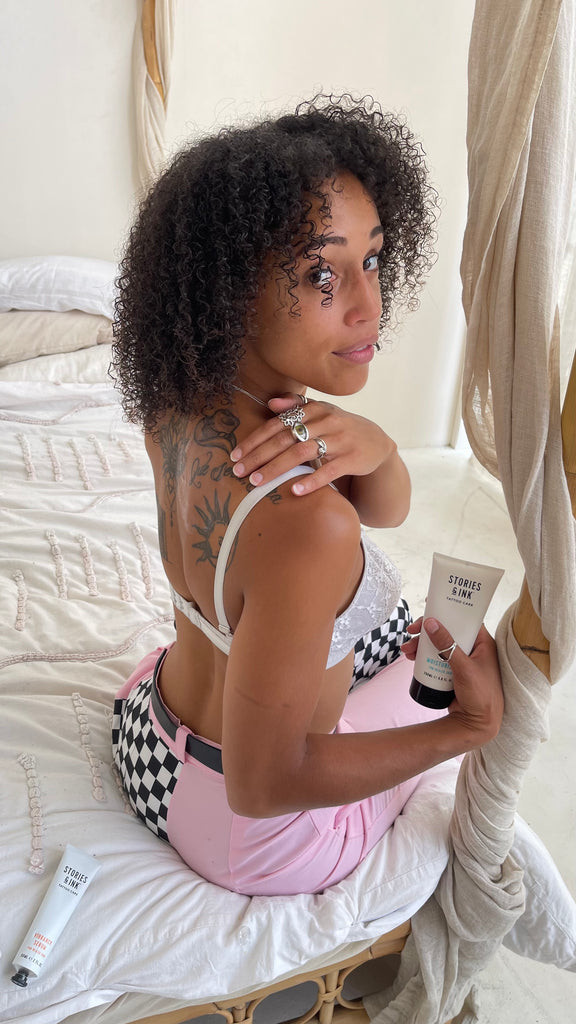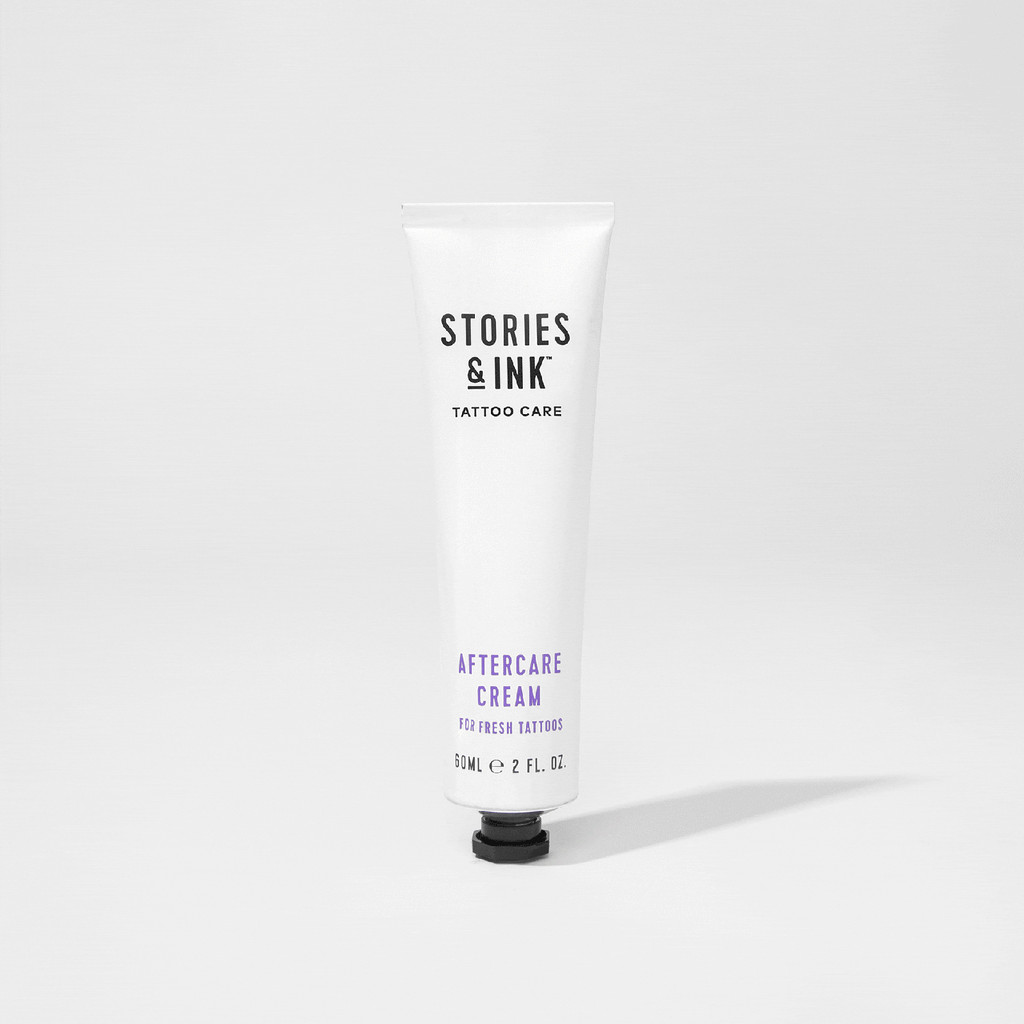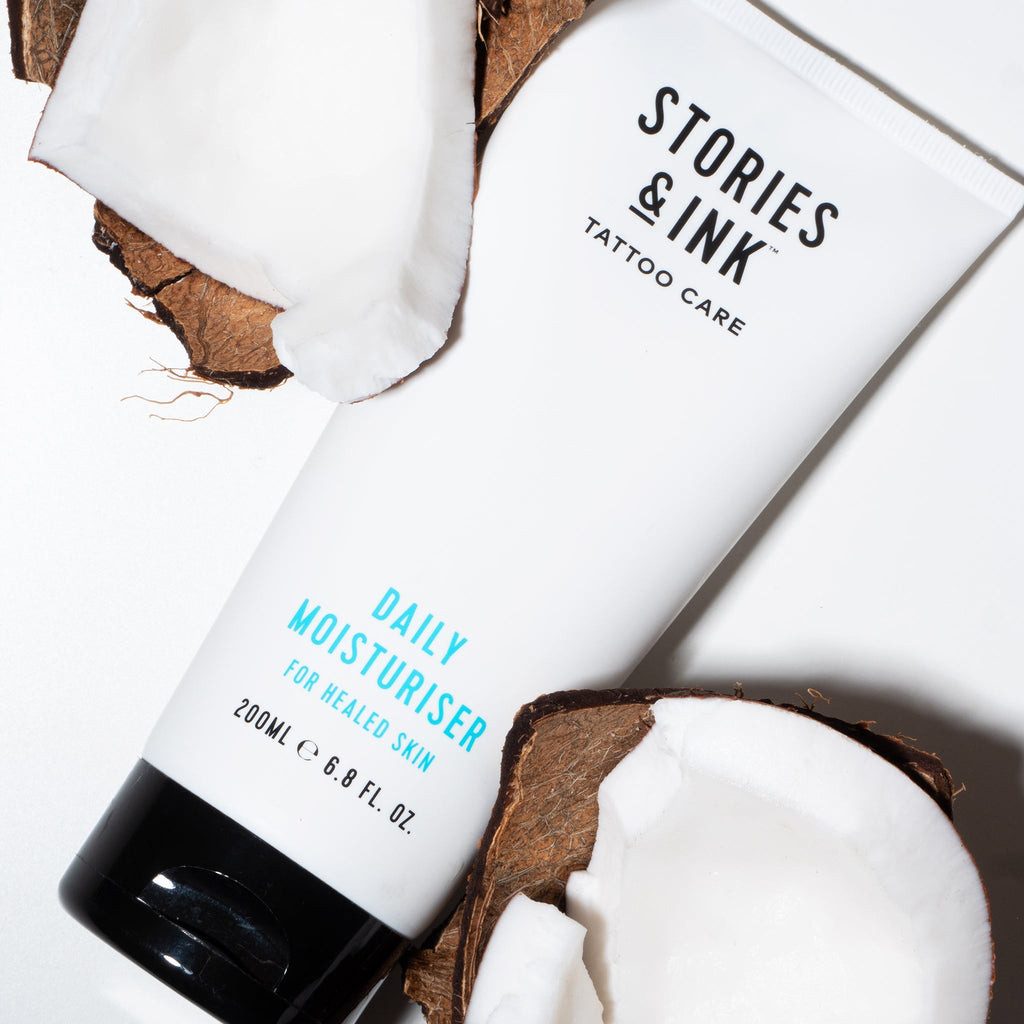Is your new ink driving you crazy with itchiness? Don’t worry, How Can I Stop My Tattoo From Itching is a common question! At tattooat.com, we understand the urge to scratch is real, but with the right care, you can relieve that itch and ensure your tattoo heals beautifully. Discover the best tattoo aftercare practices and remedies to soothe your skin, prevent infection, and keep your tattoo looking vibrant. Get ready to dive into solutions for tattoo discomfort, alleviating irritation, and maintaining healthy, stunning body art with advice from tattooat.com.
1. What Causes Tattoo Itching?
Tattoo itching happens because your skin is healing after getting inked. During the tattooing process, needles create tiny punctures in the skin to deposit ink. The body initiates an inflammatory response to repair this damage. This healing process involves several factors that can cause itching.
1.1. Skin Repair
The skin goes through stages of scabbing, peeling, and regeneration as it heals. These stages release chemicals like histamine, which can make the skin feel itchy. The newly formed skin cells are also more sensitive, contributing to the discomfort. The repair mechanisms of the skin are designed to protect the body from infection and promote tissue regeneration.
1.2. Immune Response
The body recognizes tattoo ink as a foreign substance. The immune system responds by sending immune cells to the area, causing inflammation. This immune response is crucial for preventing infection and initiating the healing process.
1.3. Histamine Release
Histamine is released as part of the inflammatory and allergic responses, which can lead to itching. Certain skin conditions can trigger the release of histamine, exacerbating the itchiness around a new tattoo.
1.4. Dry Skin
Dryness can make the itching worse. Proper hydration and moisturization are essential to prevent dryness and alleviate discomfort. According to dermatologists, maintaining skin hydration is critical for reducing itchiness and promoting effective healing.
 Woman applying tattoo aftercare cream
Woman applying tattoo aftercare cream
Moisturizing regularly keeps skin hydrated, cutting down on dryness and itchiness.
2. How Long Does Tattoo Itching Last?
Tattoo itching usually lasts for about 1 to 3 weeks, but this can vary depending on individual healing rates. Several factors, such as the size and location of the tattoo, influence how long the itching persists.
2.1. Individual Variation
Everyone heals differently. Some people may experience minimal itching, while others find it more intense. Your body’s natural healing capabilities, overall health, and adherence to aftercare instructions all play a role in determining how long the itching lasts.
2.2. Tattoo Size and Location
Larger tattoos or those in areas with more nerve endings may itch more intensely and for a longer duration. Areas with greater sensitivity tend to be more prone to itching during the healing phase.
2.3. Aftercare Compliance
Following your tattoo artist’s aftercare instructions is crucial for managing itching. Consistent cleaning and moisturizing can significantly reduce the duration and intensity of the itching.
3. How To Stop My New Tattoo From Itching?
To alleviate itching on a new tattoo, several strategies can be employed, each designed to address different aspects of the healing process and provide relief.
3.1. Avoid Scratching
Scratching can damage the skin, introduce bacteria, and prolong healing. Instead, gently pat or tap the itchy area. This helps relieve the sensation without causing harm. According to a study by Portland State University’s Art Department, in July 2023, avoiding scratching significantly reduces the risk of infection and scarring.
3.2. Keep the Area Clean
Wash the tattoo gently with mild, fragrance-free soap and lukewarm water to remove irritants. Proper hygiene is crucial for preventing infection and reducing itchiness. Washing should be done 2-3 times a day to maintain cleanliness.
3.3. Moisturize Regularly
Apply a thin layer of fragrance-free, hypoallergenic tattoo aftercare lotion or ointment. Moisturizing keeps the skin hydrated, reducing dryness and itchiness. Look for products specifically designed for tattoo aftercare to ensure they contain ingredients that promote healing.
3.4. Use Cold Compresses
Applying a cold compress or ice pack wrapped in a clean cloth can provide temporary relief. Cold temperatures help reduce inflammation and numb the area, alleviating the itch.
3.5. Wear Loose Clothing
Opt for loose, breathable clothing to minimize friction and irritation. Tight clothing can exacerbate itching and hinder the healing process. Choose natural fibers like cotton to allow the skin to breathe.
3.6. Topical Creams
Certain over-the-counter creams can help reduce itching. Ensure they are fragrance-free and hypoallergenic to avoid further irritation. Some tattoo artists recommend specific brands or ingredients, so it’s always best to seek their advice.
3.7. Stay Hydrated
Drinking plenty of water helps keep your skin hydrated from the inside out, which can reduce itching. Hydrated skin is more resilient and heals more effectively. Aim for at least eight glasses of water a day.
3.8. Avoid Sun Exposure
Sunburn can severely irritate a new tattoo, making the itching much worse. Keep your tattoo covered or use a high-SPF, tattoo-safe sunscreen. Sun protection is essential for preventing long-term damage to the tattoo and maintaining its vibrancy.
3.9. Oatmeal Baths
Oatmeal has anti-inflammatory properties that can soothe itchy skin. A short, lukewarm oatmeal bath can provide significant relief. Ensure the water is not too hot, as this can dry out the skin further.
4. Why Is My Tattoo Itching and Raised?
If your tattoo is itching and raised, it could indicate an allergic reaction or infection. It is important to identify the cause to provide effective treatment.
4.1. Allergic Reactions
Allergic reactions to tattoo ink or aftercare products can cause itching, redness, and raised bumps. Certain ink colors, particularly red, are more likely to cause allergic reactions. Discontinue use of any new products and consult with a healthcare professional if symptoms persist.
4.2. Infections
Although less common, infections can lead to increased itching, swelling, and pus. Infections require prompt medical attention to prevent complications. Maintain good hygiene and monitor the tattoo for signs of infection, such as increased pain, redness, and discharge.
4.3. Scar Tissue
Sometimes, raised areas can be due to scar tissue forming during the healing process. Scar tissue can cause itching and may require specific treatments to reduce its appearance. Gentle massage with a moisturizing lotion can help break down scar tissue over time.
4.4. Psoriasis or Eczema
Pre-existing skin conditions like psoriasis or eczema can flare up around the tattoo area. These conditions can cause intense itching and raised patches. Consult with a dermatologist for appropriate treatment options.
5. Can I Slap My New Tattoo?
While slapping your new tattoo may provide momentary relief, it is not recommended. Although it may feel good in the short term, slapping can cause damage to the healing skin.
5.1. Potential Damage
Slapping can disrupt the healing process and cause trauma to the skin. This can lead to scarring, ink loss, and a higher risk of infection. It’s best to avoid any actions that could potentially harm the tattoo.
5.2. Safer Alternatives
Instead of slapping, try patting or gently tapping the area to alleviate the itch. Applying a cold compress can also provide relief without causing damage. Safer alternatives are always preferable to protect the integrity of the tattoo.
6. What Happens If I Scratch My Tattoo?
Scratching your tattoo can have several undesirable consequences. It is important to resist the urge to scratch to ensure proper healing.
6.1. Infection Risk
Scratching introduces bacteria, increasing the risk of infection. Open wounds are susceptible to bacterial contamination, which can lead to serious complications. Keeping the area clean and avoiding scratching are crucial for preventing infection.
6.2. Scabbing and Scarring
Scratching can cause scabbing and delay the healing process. It can also lead to permanent scarring, affecting the final appearance of your tattoo. Allowing scabs to form naturally and avoiding picking at them is essential for optimal healing.
6.3. Ink Loss
Scratching can disrupt the ink placement, causing ink loss and fading. This can result in uneven coloring and a less vibrant tattoo. Protecting the tattoo from damage during the healing process helps maintain its appearance.
6.4. Prolonged Healing
Scratching prolongs the healing process and increases discomfort. Damaged skin takes longer to heal, making the itching last longer. Following proper aftercare instructions helps speed up healing and reduce itching.
7. What To Use On Your New Tattoo?
Using the right products on your new tattoo is essential for proper healing. Always follow your tattoo artist’s aftercare instructions.
7.1. Mild Soap
Gently wash the tattooed area with mild, fragrance-free soap or cleanser. Harsh soaps can irritate the skin and delay healing. Look for soaps specifically designed for sensitive skin to minimize the risk of irritation.
7.2. Aftercare Lotion
Apply a thin layer of recommended tattoo aftercare lotion or ointment. These products are designed to keep the skin moisturized and promote healing. Choose lotions that are hypoallergenic and fragrance-free to avoid allergic reactions.
7.3. Recommended Products
Consult with your tattoo artist for specific product recommendations. They can suggest products that have worked well for other clients and are best suited for your skin type. Following their advice ensures you are using safe and effective products.
7.4. Avoiding Harmful Ingredients
Avoid products containing alcohol, fragrances, or harsh chemicals. These ingredients can dry out the skin and cause irritation. Always read the label and choose products with natural, soothing ingredients.
 Stories & Ink tattoo aftercare cream
Stories & Ink tattoo aftercare cream
The Stories & Ink Aftercare Cream is hypoallergenic, fragrance free, 100% vegan and cruelty free.
8. What To Use On Old Tattoos?
Even old tattoos can occasionally itch due to dryness or environmental reasons. Proper care is essential to alleviate itching and maintain the tattoo’s appearance.
8.1. Moisturize Regularly
Dry skin can contribute to itching. Regularly moisturize your old tattoo using a fragrance-free, hypoallergenic lotion or tattoo-specific moisturizer. Apply a thin layer and gently massage it into the skin to keep it hydrated.
8.2. Avoid Harsh Chemicals
Stay away from scented lotions, perfumes, or products containing alcohol, as they can irritate the skin and exacerbate itching. Opt for gentle, non-irritating moisturizers and avoid any potential allergens.
8.3. Sun Protection
Overexposure to the sun’s UV rays can cause dryness and further irritate an old tattoo, leading to itching. Shield your tattooed skin with clothing or a broad-spectrum sunscreen with a high SPF when spending time outdoors.
8.4. Consider Antihistamines
If your old tattoo itching is persistent and severe, you can consult a healthcare professional about taking over-the-counter antihistamines. These medications can help reduce itching caused by allergic reactions or histamine release.
8.5. Gentle Exfoliation
Gentle exfoliation can help remove dead skin cells that may be contributing to itching. Use a soft cloth or a mild exfoliating scrub to gently massage the area. Avoid harsh scrubbing, which can irritate the skin.
9. Additional Tips for Managing Tattoo Itching
In addition to the above strategies, several other tips can help manage tattoo itching and promote healing.
9.1. Stay Cool
Avoid overheating, as sweat can irritate the tattoo and make the itching worse. Keep the area cool and dry to minimize discomfort. Air conditioning and breathable clothing can help maintain a comfortable temperature.
9.2. Reduce Stress
Stress can exacerbate itching. Practice relaxation techniques such as deep breathing, meditation, or yoga to reduce stress levels. Lowering stress can help improve overall skin health and reduce itching.
9.3. Avoid Irritants
Stay away from potential irritants such as tight clothing, harsh detergents, and abrasive materials. These can cause friction and irritation, making the itching worse. Choose soft, comfortable fabrics and hypoallergenic products.
9.4. Consult a Professional
If the itching persists or is accompanied by other concerning symptoms, consult a dermatologist or tattoo artist for further guidance. They can assess the tattoo and provide personalized recommendations for managing the itching.
10. Tattoo Itching: Frequently Asked Questions (FAQ)
10.1. Why is my new tattoo so itchy?
Your new tattoo is itchy because the skin is healing and regenerating. The body’s inflammatory response and histamine release also contribute to the itching.
10.2. Is it normal for a tattoo to itch during the healing process?
Yes, it is normal for a tattoo to itch during the healing process. Itching is a common sign that your skin is repairing itself.
10.3. What can I put on my tattoo to stop the itching?
You can apply a thin layer of fragrance-free, hypoallergenic tattoo aftercare lotion or ointment to relieve itching. Cold compresses can also provide temporary relief.
10.4. How often should I moisturize my new tattoo?
Moisturize your new tattoo 2-3 times a day, or as directed by your tattoo artist, to keep the skin hydrated and reduce itching.
10.5. Can I use regular lotion on my new tattoo?
It is best to use a lotion specifically designed for tattoo aftercare, as regular lotions may contain fragrances or chemicals that can irritate the skin.
10.6. What should I do if my tattoo is itching and red?
If your tattoo is itching and red, it could be a sign of an allergic reaction or infection. Consult with a healthcare professional for proper diagnosis and treatment.
10.7. Can sun exposure make my tattoo itch more?
Yes, sun exposure can cause dryness and further irritate a new tattoo, leading to increased itching. Protect your tattoo with clothing or sunscreen.
10.8. Is it okay to lightly tap or pat my itchy tattoo?
Yes, lightly tapping or patting your itchy tattoo is a safer alternative to scratching and can help alleviate the sensation.
10.9. How long does it take for a tattoo to stop itching completely?
The duration of tattoo itching varies, but it typically lasts between 1 to 3 weeks. However, individual healing times may differ.
10.10. When should I see a doctor about my itchy tattoo?
Consult a doctor if the itching persists, worsens, or is accompanied by other symptoms such as swelling, pus, or fever.
Navigating the itchiness of a new tattoo can be challenging, but with the right care and knowledge, you can ensure a smooth and successful healing process. Remember to avoid scratching, keep the area clean and moisturized, and follow your tattoo artist’s aftercare instructions. For more inspiration, tips, and access to a curated list of talented tattoo artists and studios, visit tattooat.com. Discover unique tattoo designs and essential aftercare advice to make your tattoo experience exceptional.
Address: 1825 SW Broadway, Portland, OR 97201, United States.
Phone: +1 (503) 725-3000.
Website: tattooat.com.
 Stories & Ink Daily Moisturiser
Stories & Ink Daily Moisturiser
The Stories & Ink Daily Moisturiser keeps tattoos hydrated and is appropriate for all skin types.
